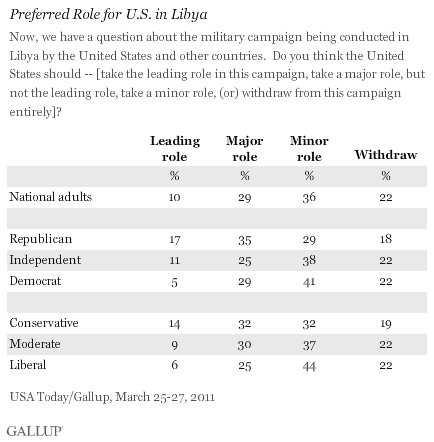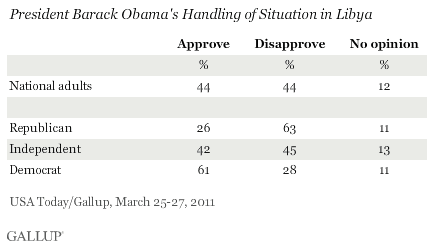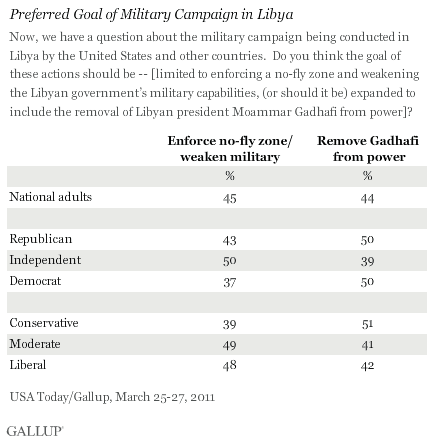PRINCETON, NJ -- Prior to President Barack Obama's speech to the U.S. on Libya Monday night, 10% of Americans said the U.S. should take the lead role in the multinational military campaign in Libya and 29% said it should have a major role. The plurality, 36%, favors a minor role for the U.S., while 22% think the country should withdraw entirely.

These results come from a March 25-27 USA Today/Gallup poll, conducted as the Obama administration was negotiating with the United States' Western allies to turn command for the Libya campaign over to NATO.
That agreement, announced Monday, is likely to be welcomed by Americans, relatively few of whom want the U.S. to play either the leading role or withdraw altogether. Republicans are slightly more in favor of a major role for the U.S., while independents and Democrats lean more toward a minor role.
Americans are evenly divided at 44% in their reactions to Obama's handling of the situation in Libya -- similar to his overall job approval rating in Gallup Daily tracking in recent days -- with Democrats much more likely than Republicans to approve of how he is responding to Libya.

Ambivalence Over Goal of the Mission
The formal goal of the NATO Libya mission is expressly humanitarian -- attempting, via a no-fly zone, to prevent Libyan leader Moammar Gadhafi from carrying out his threats to kill civilians associated with rebel forces. However, Western leaders, including Obama, have made various statements along the lines of "Gadhafi must go" that have raised questions about what the ultimate scope of the mission will be.
The American public is closely divided on this question: 45% say the goal of military actions being conducted in Libya should be limited to maintaining a no-fly zone and weakening that government's military; 44% say the mission should be expanded to removing Gadhafi from power.
Republicans and Democrats are slightly more likely to favor expanding the mission to remove Gadhafi while independents lean toward the narrower goal of enforcing a no-fly zone. The slight majority of conservatives favor toppling Gadhafi, while moderates and liberals tend to favor enforcing the no-fly zone.

Roughly 7 in 10 Americans report they are following the news about Libya very or somewhat closely -- on par with public attention to the recent uprising in Egypt, and fairly high relative to interest in other news events Gallup has polled on over the past decade.
Bottom Line
In scaling back the United States' participation in the NATO operation in Libya to a supporting role, rather than the leading role it started out with, President Obama has moved U.S. policy closer to where public opinion resides on the issue. Relatively few Americans want the U.S. to play the lead role (10%) or to withdraw altogether (22%). Most, 65%, can live with something in between -- either a "minor" or a "major" U.S. role. Whether Obama can satisfy both of these groups going forward remains to be seen, but adopting a moderate supporting role of some kind could earn broad public backing for this military engagement. At this point, the goal of the mission -- whether narrowly focused on a no-fly zone or broadened to include regime change -- does not appear to be critical in attracting majority public support.
Survey Methods
Results for this USA Today/Gallup poll are based on telephone interviews conducted March 25-27, 2011, with a random sample of 1,027 adults, aged 18 and older, living in the continental U.S., selected using random-digit-dial sampling.
For results based on the total sample of national adults, one can say with 95% confidence that the maximum margin of sampling error is ±4 percentage points.
For results based on the sample of 500 national adults in Form A and 527 national adults in Form B, one can say with 95% confidence that the maximum margins of sampling error are ±5 percentage points.
Interviews are conducted with respondents on landline telephones (for respondents with a landline telephone) and cellular phones (for respondents who are cell phone-only). Each sample includes a minimum quota of 200 cell phone-only respondents and 800 landline respondents, with additional minimum quotas among landline respondents for gender within region. Landline respondents are chosen at random within each household on the basis of which member had the most recent birthday.
Samples are weighted by gender, age, race, education, region, and phone lines. Demographic weighting targets are based on the March 2010 Current Population Survey figures for the aged 18 and older non-institutionalized population living in continental U.S. telephone households. All reported margins of sampling error include the computed design effects for weighting and sample design.
In addition to sampling error, question wording and practical difficulties in conducting surveys can introduce error or bias into the findings of public opinion polls.
View methodology, full question results, and trend data.
For more details on Gallup's polling methodology, visit https://www.gallup.com/.
